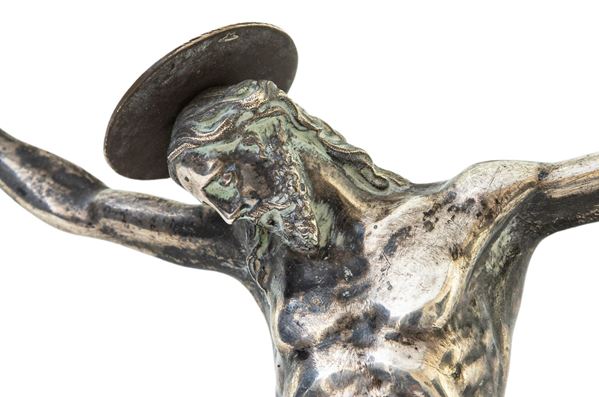34
Jean de Boulogne detto Giambologna (Douai, 1529 - Firenze, 1608)in the way of
Christ, 17th-18th century
Silver, ancient traces of oxidation
17 x 15 x 4 cm
Cataloging the crucifixes that came out of Giambologna's foundry, or from those workshops that were inspired by him, represents one of the mysteries of creation. The stylistic innovations brought to the subject by the great sculptor spread throughout Tuscany throughout the seventeenth century, generating not only bronzes, but also goldsmith works.
Far from the idea of risking attributions to great names, and a strong resemblance of the Christ presented here to certain works, in silver, by the sculptor, providing a stimulus for reflection for the connoisseur collector.
We know the corpus of large Crucifixes produced by Giambologna's foundry (SS. Annunziata, Santa Maria degli Angiolini, Convento San Marco...), reductions were made from these courtly models for domestic worship or for diplomatic gifts.
The production of these objects was carried out by Susini, his close collaborator, or by some specialized worker, presenting small variations.
Another typology is that deriving from the small altar Christ, in silver, from the Holy House of Loreto, which inspired our Crucifix. This model features a less taut thong generating a sort of triangle between the thighs. Knotted on the right side it ends with a soft and long sash.
The Crucifix in question is in evident dialogue with that model, certainly the work of Giambologna, and with it is inspired with slight variations.
In Giambologna's school the thongs vary while maintaining constants. The crucifix presented here falls within these parameters.
In Michael Hall's Parisian collection there is a crucifix very similar to the one presented here. Charles Avery states, in the critical entry, that it is a model by Giambologna with the assistance of Antonio Susini.
Literature:
Charles Avery- Michael Hall, Giambologna Sculptor of the Medici, Somogy Editions d'art, Paris, 1999, file 20, p.99.
Charles Avery- Michael Hall, Giambologna Sculptor of the Medici, Somogy Editions d'art, Paris, 1999, file 20, p.99.
Floriano Grimaldi-Massimo Masci, Giambologna fra technique and style, documented Crucifixes, Etruria Editrice, Pistoia, 2011, for the crucifix of Cardinal Ferdinando dei Medici: file 3, pp.55-60, 68-79. For the Crucifix of the Holy House of Loreto pp.45-51, images pp. 82-94.
€ 1.000,00 / 1.300,00
Estimate
€ 800,00
Starting price
Unsold
Live auction 306
Sculpture and Small Bronzes from 15th to 19th Century
Palazzo Caetani Lovatelli, fri 28 June 2024
SINGLE SESSION 28/06/2024 Hours 16:00




